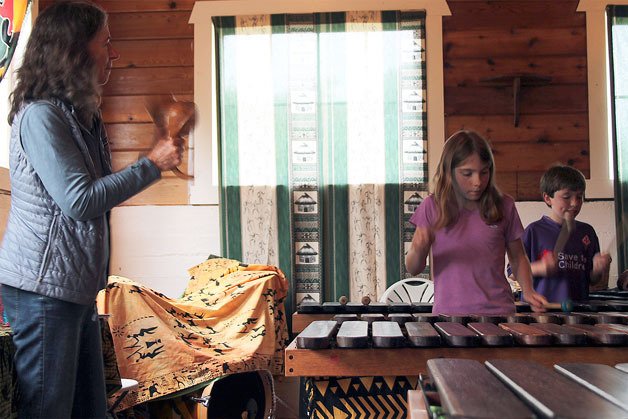With the smacking of a mallet against the wooden bars, the party has begun. The sound emanating from the marimba vibrates through the body, causing the people in the room to shuffle with the beat. The soft wooden tones are not alone, as they mix with a rhythmic clapping, shouting and feet stomping.
This isn’t a party though, it’s a children’s music class at Rubatano paChitsuwa. And all the kids’ faces are beaming.
Rubatano, which means “united on the island” in the Shona language of Zimbabwe, is the brainchild of Langley resident and director Dana Moffett, whose affinity for Zimbabwean music and culture has brought the marimba and mbira, or thumb piano, sounds to South Whidbey’s children and adults alike. Moffett’s music program offers marimba and mbira classes, workshops, camps and the opportunity to play with an ensemble of musicians. Classes operate out of Bayview Hall.
One of the advanced adult groups from Moffett’s classes called Ka 1, which is a Shona slang term for something enjoyable, will perform at the upcoming World Music Picnic hosted by Pink Parasol Productions, a wing of the Whidbey Island Arts Council that puts on free events on Whidbey. Rubatano will also host an all ages marimba workshop between 4 p.m. and 5 p.m. during the World Music Picnic, according to Madisun Elizabeth, director of Pink Parasol Productions. The festival takes place at Bayview Corner.
The World Music Picnic will feature Balkan brass music, Brazilian rhythmic tunes, a ukulele soloist and more alongside the Zimbabwean percussion group. The event starts at 4 p.m. on Wednesday, June 15.
“The picnic is for the curious and those who want a close-knit community,” Elizabeth said. “Anyone who needs a reason to dance and wear a silly costume, anyone who wants music to sweep them away or anyone who just wants to relax and have a picnic — World Music Picnic is the place to be.”
Moffett initially became interested in marimba music after becoming captivated by a performance she saw in Seattle. It was like nothing she had ever seen.
“I couldn’t pull myself away,” Moffett said. “I was really drawn to the sound and feel of it all and I noticed the people who were playing were all so happy when they hit those wooden blocks.”
She was intent on finding an instructor who could teach her the Zimbabwean marimba sound, and when she found a mentor they formed a group called Titambe. As her love for marimba music grew, she wanted to facilitate a cultural exchange by hosting traveling Zimbabwean teachers and musicians on South Whidbey. Hosting the African musicians was the highlight of her summer, and she does what she can to help set up their tours across the country.
“I was encouraged by them to start my own marimba center, and I always wanted to do that because I love the idea of supporting community building through music,” Moffett said.
She has since visited Zimbabwe nine times, consistently brought Zimbabwean music teachers to play with her classes and camps and formed a performing marimba group that has traveled across North America and performed in Zimbabwe. Her classes and camps have engaged youth and adults alike, and it’s obvious by the enthusiasm shown in the kids class as everybody dances and hammers away at their marimba’s wooden blocks.
The marimba center has bonded a lot of (Whidbey Island) people to Zimbabwean culture, Moffett said.
“As a teacher, I’m delighted by the transformation of my students as they spend time with visiting artists,” said South Whidbey High School music teacher Chris Harshman, who is also a member of Rubatano’s Ka 1. “The kids confront cultural differences and our shared human experience, and that’s important for development.”
According to Moffett, marimba is an accessible art form for beginning musicians to become involved with, as the music is played by ear and doesn’t require the ability to read music. It also offers something completely different from other types of music that can be found on the South End, something Harshman appreciates due to the unique opportunity to experience music and culture from a vastly different part of the world like Southern Africa.
“Rubatano is truly a local treasure,” Harshman said. “Celebrating world music is about acknowledging our roots… the source that runs through all contemporary and popular music.”



